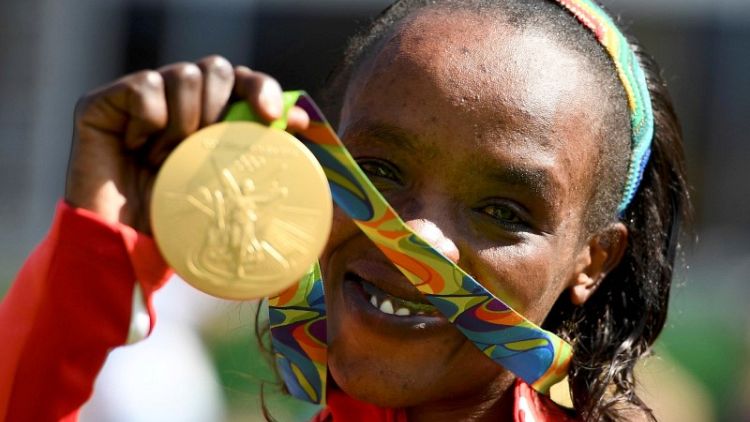(Reuters) - Olympic marathon champion Jemima Sumgong has had her doping ban doubled to eight years after being found guilty by the IAAF of providing false information while defending herself against her initial sanction, the Athletics Integrity Unit have said.
Sumgong was initially banned for four years by Kenya's anti-doping agency (ADAK) in 2017 after testing positive for the banned blood-booster erythropoietin (EPO)
The 34-year-old, who became the first Kenyan woman to win Olympic marathon gold at the Games in Rio de Janeiro in 2016, said she had been injected with EPO by an "impostor" during a doctors' strike in Kenya.
That claim was rejected as "not authentic" by the disciplinary tribunal of international athletics' governing body (IAAF).
In a ruling dated Jan. 17, the tribunal said there was also "compelling evidence" Sumgong had falsified her medical records and lied about her whereabouts after the positive test for EPO.
Her actions constituted a second anti-doping offence of "tampering with a doping control" and merited the imposition of a second four-year sanction, the tribunal, chaired by Michael Beloff QC, said in its ruling.
Accordingly, Sumgong is now banned until is April 3, 2025, although she has the right to appeal the decision to the Court of Arbitration for Sport.
Athletics Integrity Unit head Brett Clothier welcomed the tribunal's decision.
"We hope that it sends a message to dopers that the AIU has strong investigative capabilities and does not tolerate false evidence in doping cases," he was quoted as saying by the Guardian.
"We also want to underline the vital support of Anti-Doping Agency of Kenya in pursuing this case. They are a valuable partner in the fight against doping in Kenya."
(Reporting by Simon Jennings in Bengaluru; Editing by Toby Davis)


